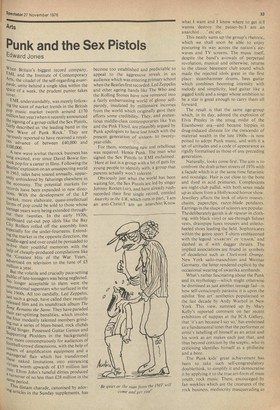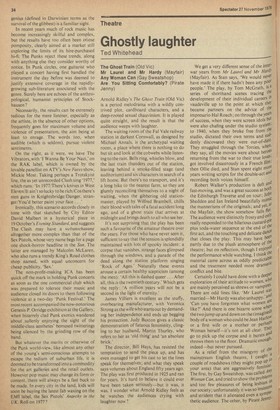Arts
Punk and the Sex Pistols
Edward Jones
When Britain's biggest record company, Ersit, and the Institute of Contemporary Arts, the citadel of the self-regarding avantgarde, unite behind a single idea within the space of a week, the prudent punter takes Cover.
. EMI, understandably, was merely following the scent of market trends in the British Pori music market (worth around £170 Million last year) when it recently announced the signing of a group called the Sex Pistols, fairly described as 'the leading band in the 'ew Wave of Punk Rock.' They are variously reported to have received a royalties advance of between £40,000 and 100,000.
A new wave is what the rock business has long awaited, ever since David Bowie forsook pop for a career in films. Following the .Beatles' explosion on an unsuspecting world In 1963, sales have soared annually, apparently unhindered by falterings elsewhere in the economy. The potential markets for records have been expanded in new directions. With the development of the LP Market, more elaborate, quasi-intellectual forms of pop could be sold to those whose teenage years were being extended throughout their twenties. In the early 1970s, cardboard cut-out pop idols like the Bay City Rollers rolled off the assembly lines !specially for the under-fourteens. Extend ing in the opposite direction, the lincldle-aged and over could be persuaded to re-live their youthful memories with the helP of cheaply-produced compilations like the 'Greatest Hits of the War Years, advertised on television to the tune of £5 ntIllion a year. But the volatile and crucially pace-setting 13,11blic of late-teenagers was being neglected. "0 longer acceptable to them were the international superstars who surfaced in the .ate 1960s,. All too candidly, Led Zeppelin, JUst such a group, have called their recently eleased film and its soundtrack album The :3(41.g Remains the Same. They have paraded II. ear-splitting banalities, which involve e four modestly talented members grind(out a series of blues-based, rock clichés s Ild Singer, Possessed Guitar Genius and uPPorting Plodders in the background) er more contemptuously for audiences of :30Iball-crowd dimensions, with the help of iowers of amplification equipment and a trn,anagerial flair which has transformed vu.ese naked limitations into entrancing virtues worth upwards of £15 million last ,,ear. Elton John's tuneful ditties produced ; turnover of no less than £28 million in the 4nle Period.
his distant charade, canonised by adortng articles in the Sunday supplements, has become too established and predictable to appeal to the aggressive streak in an audience which was entering primary school when the Beatles first recorded. Led Zeppelin and other ageing bands like The Who and the Rolling Stones have now retreated into a fairly embarrassing world of glossy selfparody, insulated by millionaire incomes from the world which originally gave their efforts some credibility. They, and pretentious middle-class contemporaries like Yes and the Pink Floyd, are plausibly argued by Punk apologists to have lost touch with the present generation of sixteento twentyyear-olds.
For them, something new and rebellious was required. Hence Punk. The man who signed the Sex Pistols to EMI exclaimed : 'Here at last is a group with a bit of guts for young people to identify with, a group that parents actually won't tolerate.' Obviously just what the world has been waiting for, the Sex Pistols are led by singer Johnny Rotten (sic), and have already rushrecorded their first single record, entitled Anarchy in the UK, which runs in part, 'I am an anti-Christ/I am an anarchist/Know
what I want and I know where to get it/I wanna destroy the passer-by/I am an anarchist . . .' etc etc.
This neatly sums up the group's rhetoric, which we shall soon be able to enjoy posturing its way across the nation's air, waves and TV screens. The music itself, despite the band's avowals of perpetual revolution, musical and otherwise, returns to the classic basement club sound which made the rejected idols great in the first place: steamhammer drums, bass guitar which combines booming intensity with melody and simplicity, lead guitar like a jagged knife and a singer whose ambition to be a star is great enough to carry them all forward.
The result is that the same age-group which, in its day, adored the explosion of Elvis Presley in the smug midst of the Eisenhower era—and became hippies in drug-induced distaste for the crescendo of material wealth in the late 1960s—is now poised to adopt Punk music, and with it a set of attitudes and a code of appearance as rigidly formalised as those of any preceding generation.
Naturally, looks come first. The aim is to confront the drab urban streets of 1976 with a facade which is at the same time futuristic and nostalgic. Hair is cut close to the bone and dyed in acid primaries. Complexions are night-club pallid, with both sexes made up as aliens from a Hollywood horror show. Jewellery affects the look of objets trouves: chains, paperclips, razor-blade pendants. Earrings in the shape of scissors are popular. Thedeliberatelygarish is de rigueur in clothing, with black vinyl or see-through fishnet vests, drainpipe lurex trousers and stilettoheeled shoes leading the field. Sophisticates within the genre sport T-shirts emblazoned with the legend 'ANARCHY' Or `CHAOS,' and slashed as if with dagger thrusts. The implied associations are found in symbols of decadence such as Clockwork Orange, New York sado-masochism and Weimar Germany, the latter rendered explicit by the occasional wearing of swastika armbands.
What's rather fascinating about the Punk and its mythology—which might otherwise be dismissed as just another, teenage fad—is how self-consciously parasitic it is upon the nihilist 'fine art' aesthetics popularised in the last decade by Andy Warhol in New York. This view, summed up by Mary Kelly's reported comment on her recent exhibition of nappies at the ICA Gallery, that 'it's art because I say so,' has enshrined as a fundamental tenet that the performer or artist's labelling of himself as an artist and his work as art makes each just that, and thus beyond criticism by the sceptic, who in criticising identifies himself as a philistine and a bore.
The Punk kids' great achievement has been to take such self-congratulatory doublethink, to simplify it and democratise it by applying it to the true art-form of mass youth, rock music. There, encouraged • by fan weeklies which are the creatures of the rock business, mediocrity masquerading as genius (defined in Darwinian terms as the survival of the glibbest) is a familiar sight.
In recent years much of rock music has become increasingly skilful and complex, but the results have too often been otiose pomposity, clearly aimed at a market still exploring the limits of its hire-purchased hi-fl: The Punks reject these trends, along with anything else they consider worthy of notice. In Punk circles, one guitarist who played a concert having first handled the instrument the day before was deemed to justify extensive coverage in the rapidly growing sub-literature associated with the genre. Surely here are echoes of the anthropological, humanist principles of Stockhausen?
Necessarily, the results can be extremely tedious for the mere listener, especially as the artiste, in the absence of other options, frequently goes for maximum volume and violence of presentation, the aim being at least to enrage. The words too, when audible (which is seldom), pursue violent sentiments.
On the right, as it were, we have The Vibrators, with 'I Wanna Be Your Nazi,' on the RAK label, which is owned by the lovable panellist on ATV's New Faces show, Mickie Most. Taking perhaps a Trotskyist line, the as yet unrecorded Clash sing '1977,' which runs: 'In 1977/There's knives in West Eleven/It ain't so lucky to be rich/Cos there's sten guns in Knightsbridge/Danger, stranger/You'd better paint your face . .
Ironically, this scenario accords closely in tone with that sketched by City Editor David Malbert in a hysterical piece in 19 October's Evening Standard, and suggests The Clash may have a weltanschauung altogether more complex than that of the Sex Pistols, whose very name begs for a page one shock-horror headline in the Sun. The latter are managed by Malcolm McLaren, who also runs a trendy King's Road clothes shop named, with equal unconcern for cheap publicity, 'Sex.'
The non-profit-making ICA has been quick off the mark in holding Punk concerts as soon as the one commercial club which was prepared to tolerate their music and audience closed its doors to them following violence at a two-day 'Punk Festival.' The most recent accompanied the now-notorious Genesis P. Orridge exhibition at the Gallery, when bizarrely clad Punk exotics wandered about sullenly enjoying the sight of the middle-class aesthetes' bemused twitterings being silenced by the grinding row of the band.
But whatever the merits or otherwise of the Punk world-view, like almost any other of the young's semi-conscious attempts to escape the tedium of suburban life, it is doomed to be transformed into a commodity for the art galleries and the retail outlets. However pop music may change its form or content, there will always be a fast buck to be made. In every city in the land, kids will soon be buying the latest lab waxing on the EMI label, the Sex Pistols' Anarchy in the UK. Roll on 1977?











































 Previous page
Previous page